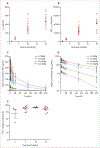Avelumab for metastatic or locally advanced previously treated solid tumours (JAVELIN Solid Tumor): a phase 1a, multicohort, dose-escalation trial
- PMID: 28373007
- PMCID: PMC6387686
- DOI: 10.1016/S1470-2045(17)30239-5
Avelumab for metastatic or locally advanced previously treated solid tumours (JAVELIN Solid Tumor): a phase 1a, multicohort, dose-escalation trial
Abstract
Background: Avelumab (MSB0010718C) is a human IgG1 monoclonal antibody that binds to PD-L1, inhibiting its binding to PD-1, which inactivates T cells. We aimed to establish the safety and pharmacokinetics of avelumab in patients with solid tumours while assessing biological correlatives for future development.
Methods: This open-label, single-centre, phase 1a, dose-escalation trial (part of the JAVELIN Solid Tumor trial) assessed four doses of avelumab (1 mg/kg, 3 mg/kg, 10 mg/kg, and 20 mg/kg), with dose-level cohort expansions to provide additional safety, pharmacokinetics, and target occupancy data. This study used a standard 3 + 3 cohort design and assigned patients sequentially at trial entry according to the 3 + 3 dose-escalation algorithm and depending on the number of dose-limiting toxicities during the first 3-week assessment period (the primary endpoint). Patient eligibility criteria included age 18 years or older, Eastern Cooperative Oncology Group performance status 0-1, metastatic or locally advanced previously treated solid tumours, and adequate end-organ function. Avelumab was given as a 1-h intravenous infusion every 2 weeks. Patients in the dose-limiting toxicity analysis set were assessed for the primary endpoint of dose-limiting toxicity, and all patients enrolled in the dose-escalation part were assessed for the secondary endpoints of safety (treatment-emergent and treatment-related adverse events according to National Cancer Institute Common Terminology Criteria for Adverse Events version 4.0), pharmacokinetic and pharmacodynamic profiles (immunological effects), best overall response by Response Evaluation Criteria, and antidrug antibody formation. The population for the pharmacokinetic analysis included a subset of patients with rich pharmacokinetic samples from two selected disease-specific expansion cohorts at the same study site who had serum samples obtained at multiple early timepoints. This trial is registered with ClinicalTrials.gov, number NCT01772004. Patient recruitment to the dose-escalation part reported here is closed.
Findings: Between Jan 31, 2013, and Oct 8, 2014, 53 patients were enrolled (four patients at 1 mg/kg, 13 at 3 mg/kg, 15 at 10 mg/kg, and 21 at 20 mg/kg). 18 patients were analysed in the dose-limiting toxicity analysis set: three at dose level 1 (1 mg/kg), three at dose level 2 (3 mg/kg), six at dose level 3 (10 mg/kg), and six at dose level 4 (20 mg/kg). Only one dose-limiting toxicity occurred, at the 20 mg/kg dose, and thus the maximum tolerated dose was not reached. In all 53 enrolled patients (the safety analysis set), common treatment-related adverse events (occurring in >10% of patients) included fatigue (21 patients [40%]), influenza-like symptoms (11 [21%]), fever (8 [15%]), and chills (6 [11%]). Grade 3-4 treatment-related adverse events occurred in nine (17%) of 53 patients, with autoimmune disorder (n=3), increased blood creatine phosphokinase (n=2), and increased aspartate aminotransferase (n=2) each occurring in more than one patient (autoimmune disorder in two patients at 10 mg/kg and one patient at 20 mg/kg, increased blood creatine phosphokinase in two patients at 20 mg/kg, and increased aspartate aminotransferase in one patient at 1 mg/kg, and one patient at 10 mg/kg). Six (11%) of 53 patients had a serious treatment-related adverse event: autoimmune disorder (two [13%]), lower abdominal pain (one [7%]), fatigue (one [7%]), and influenza-like illness (one [7%]) in three patients treated at 10 mg/kg dose level, and autoimmune disorder (one [5%]), increased amylase (one [5%]), myositis (one [5%]), and dysphonia (one [5%]) in three patients who received the 20 mg/kg dose. We recorded some evidence of clinical activity in various solid tumours, with partial confirmed or unconfirmed responses in four (8%) of 53 patients; 30 (57%) additional patients had stable disease. Pharmacokinetic analysis (n=86) showed a dose-proportional exposure between doses of 3 mg/kg and 20 mg/kg and a half-life of 95-99 h (3·9-4·1 days) at the 10 mg/kg and 20 mg/kg doses. Target occupancy was greater than 90% at doses of 3 mg/kg and 10 mg/kg. Antidrug antibodies were detected in two (4%) of 53 patients. No substantial differences were found in absolute lymphocyte count or multiple immune cell subsets, including those expressing PD-L1, after treatment with avelumab. 31 (58%) of 53 patients in the overall safety population died; no deaths were related to treatment on study.
Interpretation: Avelumab has an acceptable toxicity profile up to 20 mg/kg and the maximum tolerated dose was not reached. Based on pharmacokinetics, target occupancy, and immunological analysis, we chose 10 mg/kg every 2 weeks as the dose for further development and phase 3 trials are ongoing.
Funding: National Cancer Institute and Merck KGaA.
Copyright © 2017 Elsevier Ltd. All rights reserved.
Conflict of interest statement
Declaration of interests
BN, AvH, and KC are current employees of Merck KGaA (Darmstadt, Germany) or EMD Serono Research & Development Institute, (Billerica, MA, USA; a business of Merck KGaA, Darmstadt, Germany). AvH holds stock in Merck KGaA. J-MC was an employee of EMD Serono when the study was done and is currently an employee of Agenusbio and holds stock in Agenusbio. All other authors declare no competing interests.
Figures




Comment in
-
Avelumab, an anti-PD-L1 monoclonal antibody, shows activity in various tumour types.Lancet Oncol. 2017 May;18(5):556-557. doi: 10.1016/S1470-2045(17)30227-9. Epub 2017 Mar 31. Lancet Oncol. 2017. PMID: 28373006 No abstract available.
References
Publication types
MeSH terms
Substances
Associated data
Grants and funding
LinkOut - more resources
Full Text Sources
Other Literature Sources
Medical
Research Materials

